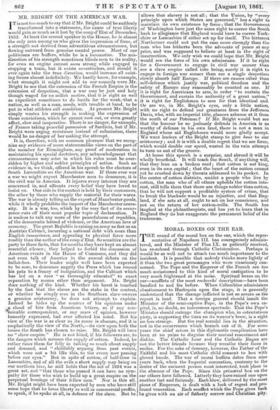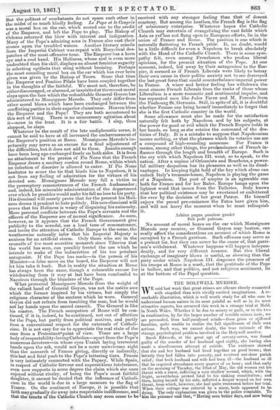MORAL BOXES ON THE EAR. T HE sound of the moral
box on the ear, which the repre- sentative of Napoleon III. has courageously adminis- tered, and the Minister of Pius IX. as patiently received, has re-echoed through Catholic Christendom. Perhaps it would be as well not to attach too much importance to the incident. It is possible that nobody thinks more lightly of it than the two great personages who were vicariously con- cerned. The Pope and the Emperor of the French are too much accustomed to this kind of moral castigation to be very much frightened at the noise. Spiritual boxes on the ear—souffiets of the most recherché description:---have been bandied to and fro before. When Columbine administers chastisement to Harlequin upon the stage, it is generally understood that the damage inflicted is not so severe as the report is loud. That a foreign general should insult the Minister of the semi-captive Pope, in the Pope's own ca- pital, is, no doubt, an indecorous spectacle: That the Pope's Minister should outrage the champion who, in ostentatious piety, is supporting the tiara on its wearer's brow, is a sight no less strange. But the real scandal lies in the situation, not in the occurrences which branch out of it. For some years the chief actors in this diplomatic complication have been at no pains to disguise their mutual resentment and dislike. The Catholic Lear and the Catholic Regan are not the better friends because they wreathe their faces in smiles. For the sake of decency, however, the Father of the Faithful and his most Catholic child consent to box with gloved hands. The war of moral buffets dates from nine years back, when the Imperial coronation, contrary to the desire of the eminent person most interested, took place in the absence of the Pope. Since this priwaval box on the ear others have followed. Latterly they have rained one upon another fast and furiously. Each blow, delivered by the most pious of Emperors, is dealt with a look of regret and pro- found veneration. Each souffiet which the Pope gives back he gives with an air of fatherly sorrow and Christian pity. But the politest of combatants do not spare each other in the midst of so much kindly feeling. Le .Pope et le angres was a moral box on the ear, which scored one to the credit of the Emperor, and left the Pope to play. The Bishop of Orleans returned the blow with interest and indignation. Many of the Pope's admiring sons in France also cast their stones upon the troubled waters. Another literary missile from the Imperial Cabinet was repaid with Encyclical des- patches of' the most offensive tone. The Emperor has a keen eye and a cool hand. His Holiness, whose zeal is even more undoubted than his skill, displays an almost feminine sagacity in selecting epithets that sting without bruising. Perhaps the most sounding moral box on the ear which has ever been given was given by the Bishop of Tours. Since that time the Emperor and Pontius Pilate have been coupled together in the thoughts of the faithful. We must not, therefore, be either discouraged, or alarmed, or inspirited at the recent moral slaps upon the face which the redoubtable General Goyon has administered to Monsignore Merode. They only differ from other moral blows which have been exchanged between the conflicting parties in their superior clumsiness. Heaven bless the Emperor and the Pope ! They are both accustomed to this sort of thing. There is no unnecessary agitation about it—none in the least. It is a fair battle. I slap, thou alappest, he slaps. Whatever be the result of the late undiplomatic scene, it cannot be said to have at all increased the embarrassment of the Emperor's position at Rome. Monsignore Merode's im- petuosity may serve as an excuse for a final adjustment of the difficulties, but it does not add to them. Insults enough have been long ago exchanged freely on both sides. It is from no attachment to the person of Pio Nono that the French Emperor draws a sanitary cordon round Rome, within which no infection of disorder is allowed to enter. If Pio Nono hesitates to sever the tie that binds him to Napoleon, it is not from any feeling of admiration for the virtues of his devoted son. Monsignore Merode may fall a victim to the peremptory remonstrances of the French Ambassador; and, indeed, his miserable administration of the department over which he presides would make his fall no loss to his party. His dismissal will merely prove that for the present his Holi- ness deems it prudent to hate politely. His non-dismissal will prove that his Holiness is weary of disguising his animosity. Mere personal conflicts between the Pope's servants and the officers of the Emperor are of no real significance. As soon, however, as it appears that the French Government give publicity to the scandal, use a loud tone of remonstrance, and invite the attention of Catholic Europe to the scene, the weatherwise naturally infer that his Imperial Majesty is anxious for an artificial storm. Only those who are in the councils of the most secretive monarch since Tiberius that the world has seen, can possibly foretel the use which he intends to make of the indiscretion of his too petulant antagonist. If the Pope has made—in the person of his Minister—a fidse move on the board, the Emperor will not let him take it back. But in reality the situation at Rome has always been the same, though a colourable excuse for withdrawing from it may at last have been vouchsafed to Napoleon through the blunders of the Pope. What protected Monsignore Merode from the weight of the valiant hand of General Goyon, was not the native awe which the former inspired by his virtues, but simply the religious character of the soutane which he wore. General Goyon did not refrain from insulting the man, but he would not lay hands upon the sacred cassock. The General is like his master. The French occupation of Rome will be con- tinued, if it is, indeed, to be continued, not out of affection for the Pope, but partly from political motives, and partly from a conventional respect for the externals of Catholi- cism. It is not easy for us to appreciate the real state of the case from a Protestantepoint of view. There are a large body of respectability-loving Catholics—apart from the Pope's numerous devotees—in whose eyes Uzziah laying irreverent hands upon the ark, would not be a more unwelcome sight than the monarch of France giving, directly or indirectly, this last and fatal push to the Pope's tottering tiara. France i.s very intimately connected with the Papacy. While Spain, in respect of Catholic fervour and superstitious intolerance, even now supports in some degree the claim which she once enjoyed without rivalry, of being the Pope's most faithful daughter, it cannot be denied that the influence of Catholi- cism in the world is due in a large measure to the flag of }ranee. On the continent of Europe, it is possible that faith may gradually die away into respectable indifference, and that the tenets of the Catholic Church may soon cease to be received with any stronger feeling than that of decent courtesy. But among the heathen, the French flag is the flag of missionary enterprise. 'Whatever hopes the Catholic Church may entertain of evangelizing the vast fields which Asia as yefhas not flung open to European efforts, lie in the union of France and Rome. The position is one which is naturally flattering to French pride. It, no doubt, would be a little difficult for even a Napoleon to break absolutely with the Head of the Catholic Church. There is some sym- pathy felt, even among Frenchmen who profess liberal opinions, for the present situation of the Pope. At one moment, indeed, led away by their antagonism to the Em- pire, it seemed as if French Liberals were likely to betray their own cause in their politic anxiety not to see destroyed the last great force that could counterbalance imperial power in France. A wiser and better feeling has withdrawn the most sincere French Liberals from the ranks of those whose Liberalism is a mere romantic,and sentimental impulse, and has separated men like Jules Fevre and M. Forcade from the Faubourg St.',Germain. Still, in spite of all, it is doubtful whether France can bring herself immediately to forget that she is the first Catholic country in the world.
Some allowance must also be made for the satisfaction naturally felt both by Napoleon and by his subjects at the power for good or evil which the French Empire holds in her hands, so long as she retains the command of the des- tinies of Italy. It is a mistake to suppose that Napoleonism means nothing, or that the phrases which its votaries use are a compound of high-sounding nonsense. For France it means, among other things, the predominance of French in- fluence through the length and breadth of Europe. Such is the cry with which Napoleon III. went, so to speak, to the nation. After a regime of Orleanists and Bourbons, a power- ful military despotism has its pleasures as well as its disad- vantages. In keeping tight hold of the key which alone can unlock Italy's treasure-house, Napoleon is playing the game of a Napoleon. The post of umpire is an agreeable one both for France and for her Ruler. Europe hangs upon the lightest word that issues from the Tuileries. Italy knows that her political existence may be sweetened or embittered for ever by the decision of her great Patron. He himself enjoys the proud pre-eminence the Fates have given him, and will not hurry the 'moment when he must relinquish it.
Arbiter pugna posuisse gaudet Sub pcde palmam.
No amount of moral boxes on the ear which Monsignore Merode may receive, or General Goyon may bestow, can really affect the considerations on account of which Rome is occupied by a French garrison. Such offences may serve as a pretext for, but they can never be the cause of, that garri- son's withdrawal. Whatever happens will happen indepen- dently, and for very different reasons. But this liberal exchange of imaginary blows is useful, as showing that the piety under which Napoleon III. disguises the presence of his troops at Rome is a mask, that the gratitude of the Pope is hollow, and that politics, and not religious sentiment, lie at the bottom of the Papal question.































 Previous page
Previous page